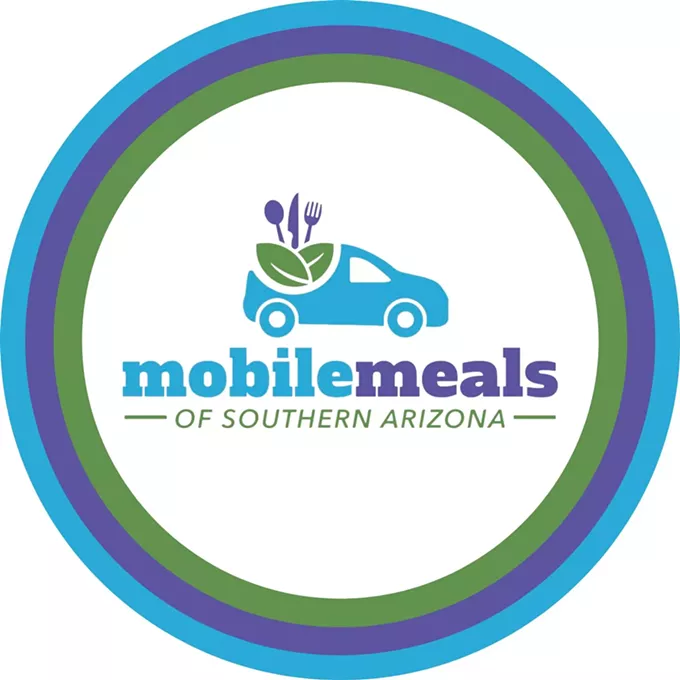
With food insecurity facing thousands in Pima County, Mobile Meals of Southern Arizona drops off lunch and dinner five days a week to the tune of 500 meals a day, or 110,000 meals annually to homebound individuals and seniors.
Founded in 1968 with a grant from Meals on Wheels, a core group of volunteers continued the service once the grant ended two years later. The organization evolved into Mobile Meals of Southern Arizona. The volunteers’ visits are two-fold – to meet the nutritional needs of the clients and socialize with them.
“The meals are prepared by local hospitals and are designed according to the medical needs of the client,” said Robert Jensen, CEO. Mobile Meals offers 10 diet-specific meals to address various health issues or dietary recommendations, including cardiac, diabetic, renal, cancer support, soft foods, low sodium, low sugar, low fat and others.
“These meals are delivered by a team of 400 volunteers that do a wellness check on our clients every day,” Jensen said. “Many times, our volunteers are the only contact these folks get.” In MMVA’s most recent survey, the delivery drivers were the favorite service of the clients. “MMVA is 50% nutrition and 50% compassion,” Jensen said.
A personal connection
Volunteers ensure that clients receive a friendly visit, a moment to talk to a real person face-to-face and a wellness check on necessities, such as running water, a home in decent repair or use of other utilities. If the client has issues with one of these items, MMVA connects the client to other community organizations to assist them.
MMVA delivers to anyone with a need and an address. “Because of many health issues related to aging, our clients tend to be elderly individuals,”
When a client is referred to MMVA, MMVA conducts an interview, typically by phone, to assess the individual. A nutritionist is consulted to choose a diet. Meals are priced on a sliding scale, depending on income. “Those with little to no income received the meals for free, and the price progresses up to $5 a meal for those with an adequate income but a need for the meals or a special diet.”
Some clients are long-term, as the service enables them to stay in their home and not need to enter an assisted living facility. Others may only need the meal service temporarily as they recover from surgery or an illness.
MMVA expects to increase services “four-fold” with the opening of a new kitchen at the former El Indio restaurant. Once the facility undergoes $600.00 in renovations to accommodate new administrative offices and a remodeled kitchen at the 4,500-square-foot building, the renovation of the new digs will allow more clients to be served and more meal choices, allowing MMVA to conduct emergency feedings, catering, and expand the nonprofit’s footprint geographically and demographically. Donors can help with the funding campaign by visiting the MMVA website.
Jensen said the new kitchen will allow the Dining with Dignity program to begin. Local chefs will prepare one of their favorite recipes to be showcased for the entire month. “So even though you may not be able to leave your house to go to a nice restaurant, we will bring that restaurant’s food to you,” Jensen said. “As you age and your health begins to decline, you don’t have many choices you can control. But you can control what you eat. So, we are going to give you that choice and quality, and increase the dignity of your dining.”
Volunteers will now have a gathering place to mingle with other volunteers and the MMVA team. Currently, volunteers pick up meals at the loading docks of hospitals. “They have very little interaction among themselves due to these conditions. Now they will be able to sit in the volunteer café, and get a cup of coffee or tea, nibble on foods put out by the chef, such as fruit or veggie trays. They will be able to build relationships with like-minded volunteers.”
Donors see results
MMVA is funded by private donors, foundations and local corporate partners. The nonprofit writes grants to city, county, state and federal governmental agencies and private foundations.
Donors can also see all facets of the organization in full swing. “They can meet the volunteers, talk with their operations team and see the food being prepared. They will see the fruits of their labor up close and in person.”
Residents can register for meal service, donate or volunteer at the website at mobilemealssoaz.org. They can also call 520-622-1600.
The 400 volunteers primarily perform the meal deliveries. “It is the best volunteering gig in town,” Jensen said. “You pick one day of the week, you drive your own car, listening to your own tunes from 11 am to 1 pm, and you deliver nutrition and smiles. We also have office volunteers that do typical office duties such as filing, calling clients, etc. With the opening of our new kitchen facility, we will also have volunteering opportunities to prepare food in the kitchen.”
A key determinant of health in addition to adequate nutrition is socialization, Jensen said. “According to the National Institute of Aging, social isolation and loneliness has been linked to a variety of physical and mental conditions, including high blood pressure, heart disease, obesity, a weakened immune system, anxiety, depression, cognitive decline, Alzheimer’s disease and death,” said Jensen. As volunteers meet with clients, relatives who often live in other parts of the country are reassured that loved ones are being cared for, he said.
.